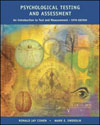 |  Psychological Testing and Assessment: An Introduction To Tests and Measurement, 5/e Ronald Jay Cohen
Mark Swerdlik
The Assessment of People with Disabilities
| Accommodation | (1) In Piagetian theory, one of two basic mental operations through which humans learn, this one involving change from what is already known, perceived, or thought to fit with new information (contrast with assimilation); (2) in assessment, the adaptation of a test, procedure, or situation, or the substitution of one test for another, to make the assessment more suitable for an assessee with exceptional needs; (3) in the workplace, modification of or adjustments to job functions or circumstances.
|  |  |  | | Adaptive behavior | Personal conduct that one is capable of modifying in age-appropriate ways to effectively address needs, demands, and challenges, 498-501
|  |  |  | | At-risk infant or toddler | According to IDEA, a child under 3 years of age who would be in danger of experiencing a substantial developmental delay if early intervention services were not provided, 480
|  |  |  | | Cognitive disability | A general reference to a broad spectrum of disabling conditions, including various neurological deficits, learning disabilities, autism, and mental retardation, 498-502
|  |  |  | | Disability | As defined in the Americans with Disabilities Act of 1990, a physical or mental impairment that substantially limits one or more of the major life activities of an individual, 479-504
|  |  |  | | Functional disability | A condition in which one's ability to perform in some characteristic physical, social, or other way has been disrupted, 484
|  |  |  | | Major life activity | Although not expressly defined by the Americans with Disabilities Act of 1990, presumed to constitute functions such as caring for oneself, performing manual tasks, walking, seeing, hearing, speaking, breathing, learning, sitting, standing, lifting, reading, reaching, reproducing, and working, 489.
|  |  |  | | Perceived disability case | Litigation or other claim involving employment discrimination against a person who is regarded as having an impairment and is discriminated against as a result of that perception, 489
|  |  |  | | QUID | Acronym for "qualified individual with a disability," especially with respect to the Americans with Disabilities Act of 1990; a disabled employee who meets the employer's standards for education, skill, and other job-related qualifi-cations and who can perform the essential functions of the job with or without accommodation in the workplace, 490
|
|



 2002 McGraw-Hill Higher Education
2002 McGraw-Hill Higher Education